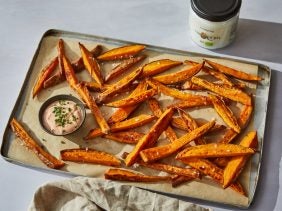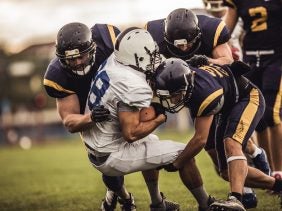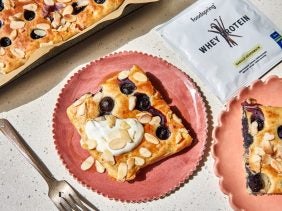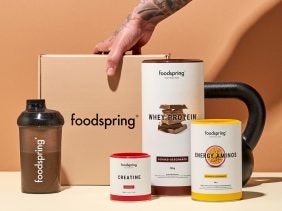What to eat on rest days: 6 tips to maximize recovery
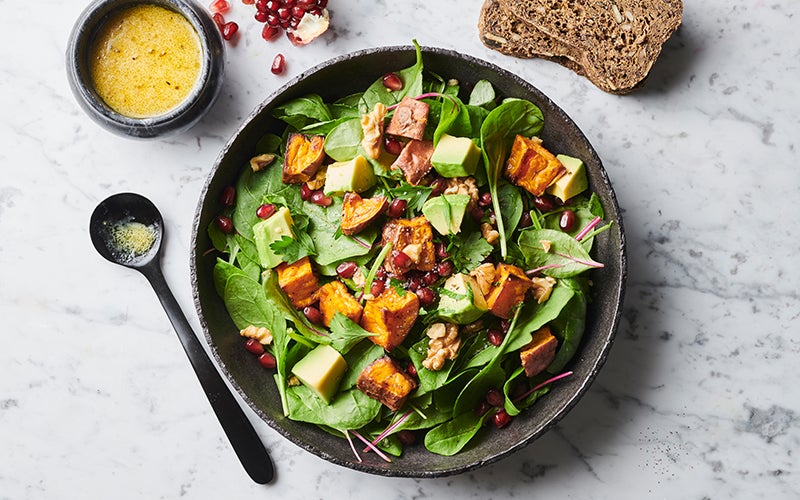 ©foodspring
©foodspring
The right nutrition plan for your workout-free days helps you reach your fitness goals faster. Let’s dive into why that is, what to eat on rest days, and what to avoid.
Rest days are just as important as training days, because they’re when your body has a chance to recover. It repairs your muscles, breaks down harmful substances, and improves your strength so you can start your next workout even stronger. This effect is called supercompensation and it’s essential for making progress toward your goals.
What to eat on rest days for maximum recovery
In order to benefit from the supercompensation effect, your body needs energy and the right macro- and micronutrients. An electric car doesn’t run without enough charge in its battery. And an electric engine doesn’t run on gas. The right nutrition determines how quickly you reach your goals. But if you feed your body right, every recovery phase will come with gradual improvements in your fitness and strength.
Tip: Your body can’t start the muscle repair process fast enough, which is why your food choices after exercise play an important role in your recovery. An extra serving of amino acids, and easy to digest carbs to cover your energy needs, will switch your muscles into recovery mode right after you’re done working out.
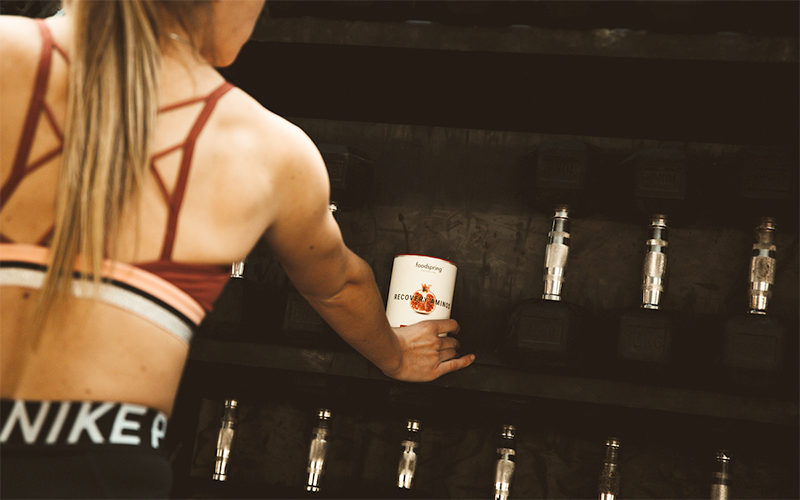
Rest Day Calorie Deficit or Surplus?
Your calorie intake on a rest day should be about the same as days with an exercise routine. Besides, both muscle building and weight loss aren’t about perfectly hitting your daily calorie totals. In the end, your weekly total calories and distribution of macronutrients are what counts.
Listen to your body and eat your fill without overdoing it. Focus on healthy foods and don’t confuse your rest day meals with a cheat day. Since you don’t exercise on a workout-free day, your body has enough energy left to regenerate. This is also true if your diet includes a calorie deficit.
Tip: To ensure long-term weight loss success, your daily calorie deficit should be between 300-500 calories. With our Body Check, it’s easy to calculate how many calories you need for your goal.
If you’re in a muscle building phase, you can reduce your daily calorie surplus by about 10-20% on a non-training day. But make sure that you’re still providing your body with enough protein for muscle protein synthesis.
6 Tips for the Perfect Rest Day Nutrition for Your Body
Now that we’re done with the theory and background information part, let’s talk about what you should actually eat on a rest day.
#1 Listen to your body
Pay really close attention to what your body needs at rest. Eat slowly and mindfully, stop when you’re full, and only eat when you’re hungry. Don’t give in to every chocolate craving! They rarely have anything to do with actual intuitive eating.
For the most part, food cravings signal that your body is lacking something. Chocolate contains zinc and readily accessible carbs in the form of sugar. Good news: healthy alternatives, like oatmeal, include carbs, zinc, and even more micronutrients.
#2 Eat foods with a high nutrient density
That means cutting out empty carbs and low-quality fats. Instead, eat foods with a higher nutrient density, so lots of vitamins and minerals.
Vegetables, legumes, and whole grains are always a good choice. If it has to be pizza, go for our vegan Protein Pizza.
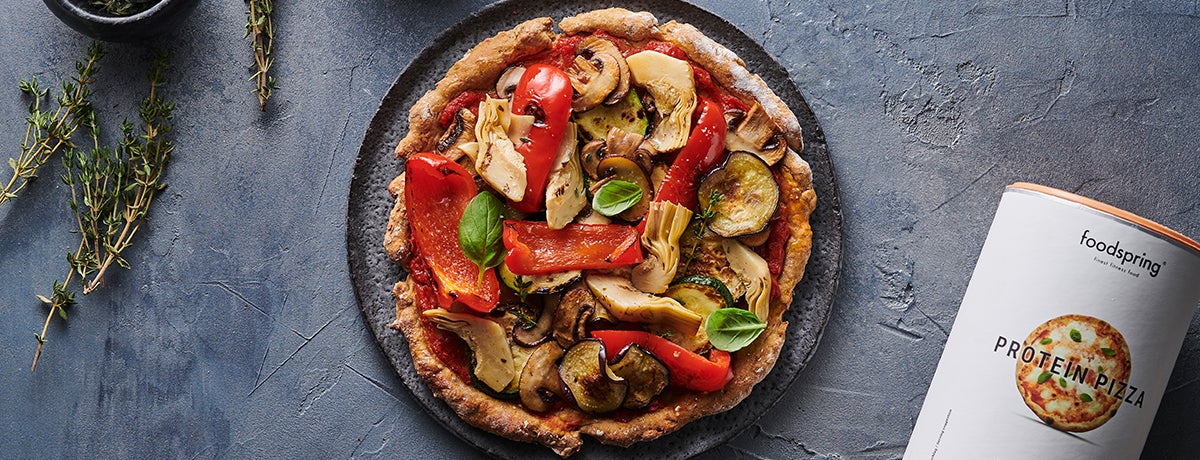
Nutritional supplements aren’t the same as fresh vegetables. But when you can’t manage to eat a balanced diet, our Daily Vitamins can help compensate! They’re made from freshly harvested fruits and vegetables from sustainable agriculture.
If you’re doing a lot of cardio, make sure you’re also getting enough potassium! This electrolyte is the counterpart to sodium and is essential for the production of energy (ATP) and glycogen stores.
Foods rich in potassium include: bananas, apricots, raspberries, carrots, cabbage, cashews, almonds, and peanuts.
Tip: Especially during intense cardio workouts over the summer, you’ve got to keep drinking water and paying attention to your protein needs.
#3 Reduce carbs
On non-training days, you don’t need the same energy intake you need pre-workout. That’s why it’s okay to eat less carbohydrate-heavy throughout the day. Fuel your muscles with high-quality protein and healthy fats instead! It’s also the perfect opportunity to try out healthy low-carb recipes.
Tip: With our protein powders and snacks, you can easily meet your protein needs.
#4 Adjust your macros to your goal
The distribution of your macros, i.e. fat, carbs, and protein should always be aligned with your workout nutrition goal. As an athlete, you always need all three nutrients: it’s only their proportions that vary. If you do a lot of cardio exercise, you’ll need a higher carbohydrate percentage.
If strength training or weight loss is your focus, make sure you get enough protein and a balanced supply of amino acids alongside your fat intake.
#5 Eat meals with high-quality ingredients
Want your body to be at its best? Then you’ve got to give it the best! Avoid foods with extra added sugars or chemical additives, and go for fresh fruits and vegetables instead. Basically, the more natural a food, the better.
Legumes like chickpeas or grains like quinoa give you complex carbs, protein, fiber, and a varied mix of nutrients all in one. No idea what to cook with them? Our fitness recipes are a great place to start!
#6 Cover your protein needs
To recover optimally and start building muscle, your muscles need protein. As a guideline, 1.2g protein intake per kilo of body weight is a good amount for any day. This also applies when you want to lose weight instead of building muscle.
While post-workout Whey Protein shakes are a good solution for muscle growth, protein powders that provide the body with nutrients over the long term, such as casein or Vegan Protein, are a better choice on a non-training day.
Recipes for Muscle Building on Rest Days
Protein Pizza Bianca | 74% fewer carbs
Pizza doesn’t have to be greasy and unhealthy. Our summery Pizza Bianca tastes just as delicious as the one from the Italian place next door, and it’s got the perfect combo of macros for your rest day.
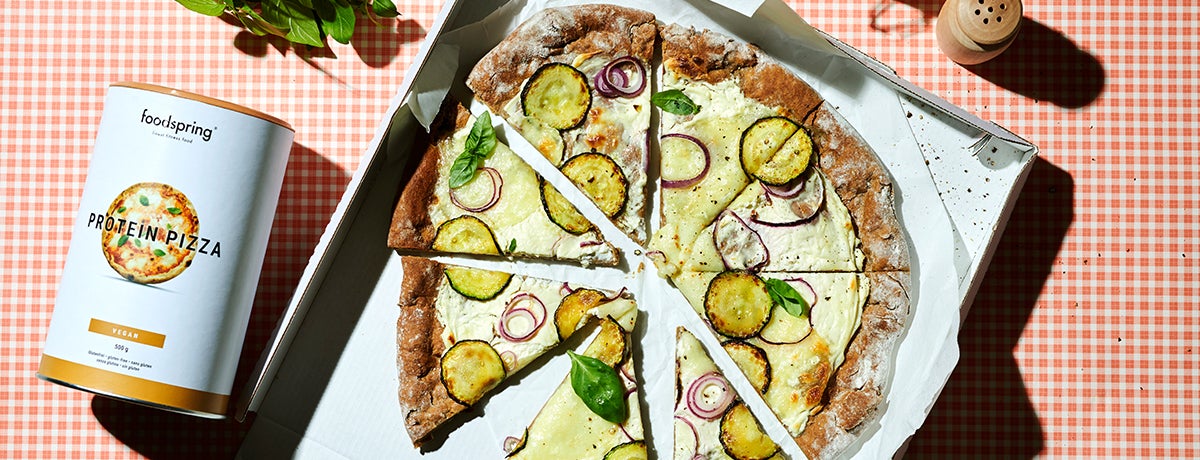
Light and Cheesy Pasta | Quick meal ready in 25 Min
It’s quick to prepare and packs a whole 53g protein and only 27g carbs per serving, so it’s our perfect pasta recipe for your rest day on a muscle building diet.
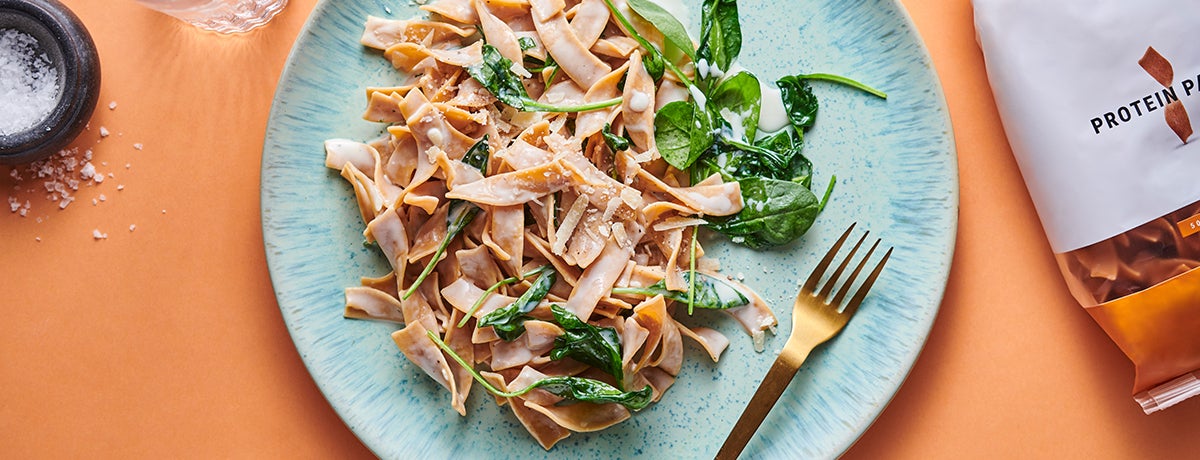
Recipes for Weight Loss on Rest Days
Banana Waffles | Fluffy, vegan waffles
Our vegan waffles have protein instead of added sugar, which makes them perfect for breakfast on a day off. And they’re ready in just 15 minutes.
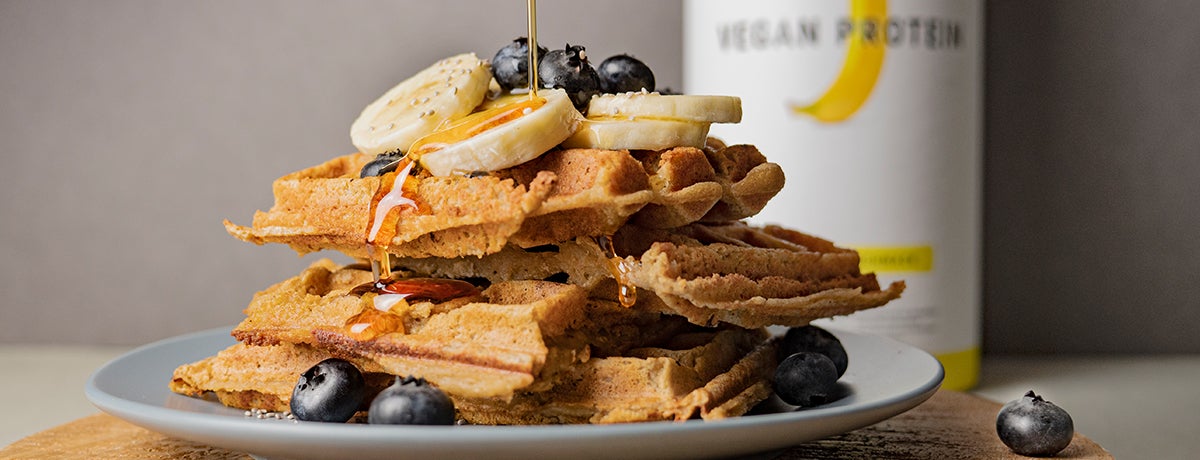
Stuffed Sweet Potato | Healthy & easy
Healthy, delicious, vegan, and easy to prepare. This recipe isn’t quite low carb, but it gives you tons of complex carbs including many valuable micronutrients. Perfect for lunch on a non-workout day.
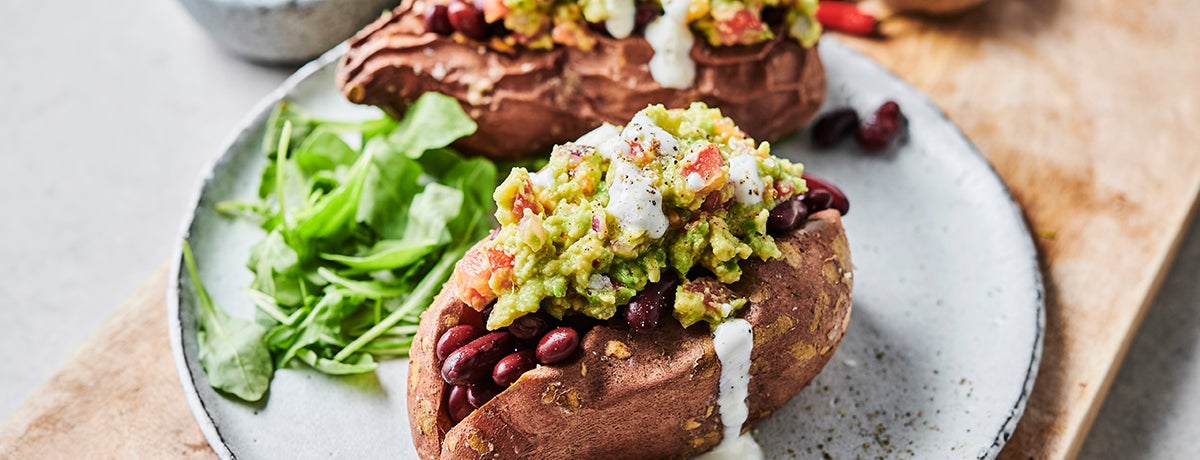
Field Salad with Sweet Potatoes and Avocado
This salad provides you with high-quality fats, vitamins, and minerals, and it’s easy to digest, so it fits perfectly into your nutrition plan for weight loss. Avocado and sweet potato add calories, but thanks to their high nutrient density and fiber content, they’ll also keep you fuller longer.
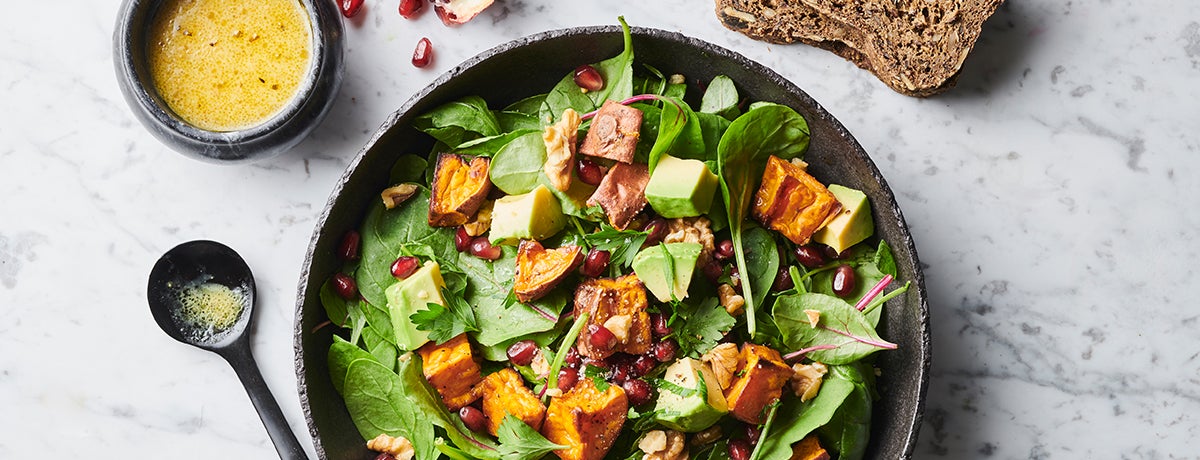
Conclusion
- Your meals on rest days should have a high nutrient density.
- Nutrition is an important factor in your muscle recovery.
- Maintain your calorie deficit, or your calorie surplus minus 10-20%, when you’re not exercising.
- Workout-free days are perfect for trying out low-carb recipes.
- Rest days are not cheat days.
Sources for this article
We at foodspring use only high-quality sources, including peer-reviewed studies, to support the facts within our articles. Read our editorial policy to learn more about how we fact-check and keep our content accurate, reliable, and trustworthy.


























